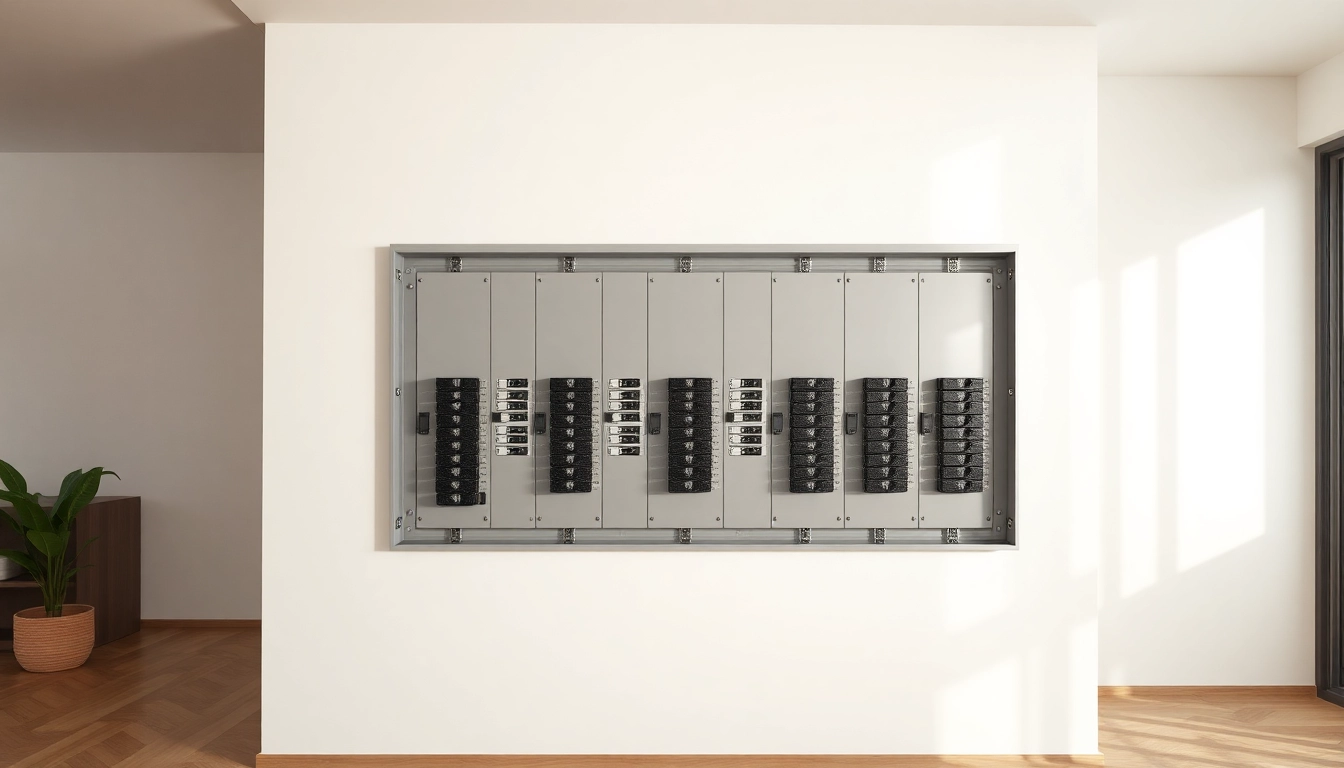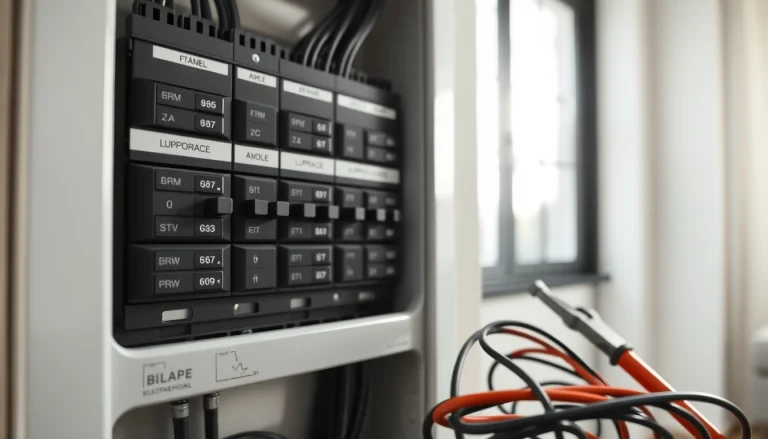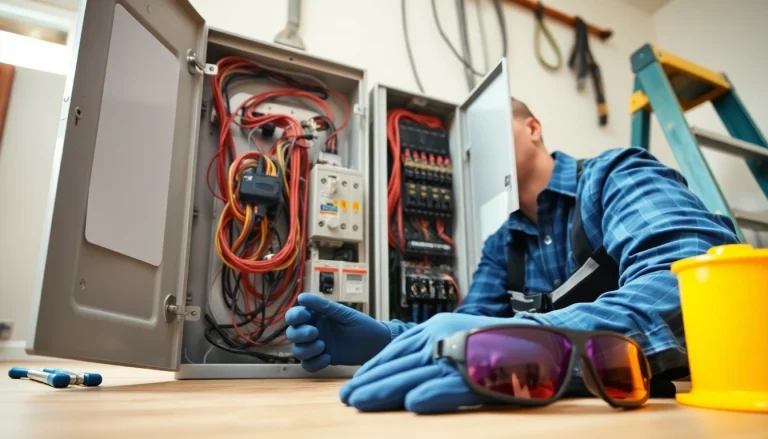What Is an Electrical Panel?
Definition and Functionality
An Electrical Panel, often referred to as a breaker panel or service panel, is a crucial component of any residential or commercial electrical system. It functions as the central distribution point for electrical circuits, controlling the flow of electricity throughout the building. Each panel houses a system of circuit breakers or fuses that work to prevent overloading of circuits and to facilitate the safe operation of electrical appliances and fixtures.
Components of the Electrical Panel
An electrical panel comprises several key components, which include:
- Main Breaker: This is typically the switch that controls the entire power supply to your home, allowing you to cut off electricity quickly in emergencies.
- Circuit Breakers: Also called fuses, these protect individual circuits from overloads by tripping when the current exceeds a safe threshold.
- Bus Bars: These metal strips are responsible for carrying electricity from the main breaker to the circuit breakers.
- Neutral and Ground Bars: These components safely route excess electrical current into the ground, preventing electrical faults.
- Enclosure: The protective box housing all these elements, typically made of metal or durable plastic.
Importance of Electrical Panels in Homes
The significance of an Electrical Panel cannot be overstated. It acts as the heart of your electrical system, centralizing the distribution of power. Here are some reasons why it is essential:
- Safety: A well-functioning panel prevents electrical hazards, including fires and equipment damage, by managing electrical loads effectively.
- Control: With an electrical panel, homeowners can control electricity usage, enabling them to shut down power to specific areas or circuits as needed.
- Upgradability: As homes evolve with technology and as electrical demands increase, having a capable electrical panel allows for future upgrades without replacing the entire electrical system.
Signs Your Electrical Panel Needs an Upgrade
Common Warning Signs
Identifying when your electrical panel needs an upgrade is crucial for maintaining a safe home. Here are common warning signs:
- Frequent Tripping: If circuit breakers frequently trip, it indicates that your electrical panel might be overloaded.
- Burning Smell or Discoloration: Any burnt odor or discoloration near the panel is a serious warning sign of overheating and requires immediate attention.
- Old Technology: If your panel is outdated and utilizes fuses instead of circuit breakers, it’s time for an upgrade.
- Inconsistent Power Supply: If certain outlets or fixtures flicker or do not receive power, this could indicate deficiencies in the panel.
Capacity Limitations Explained
Electrical panels come with specific capacity ratings, typically 100, 200, or even 400 amps. If your household electrical demand exceeds the capacity of your electrical panel, this can lead to overheating and failure. It is essential to understand your home’s electrical usage, especially as more appliances are added or if you convert spaces to accommodate heavy electrical equipment (e.g., a home office, a workshop, or a gym).
Safety Hazards and Code Compliance
Older panels may not comply with current National Electrical Code (NEC) standards. Upgrading your panel can resolve various safety concerns and ensure compliance with today’s regulations. This is particularly important if you live in an older home, as the electrical codes have evolved significantly.
Different Types of Electrical Panels
Main Breaker Panels vs. Subpanels
There are two main types of electrical panels: main breaker panels and subpanels. Main breaker panels serve as the primary control for your entire electrical supply, while subpanels distribute power to specific areas of the home without needing to run extra wiring back to the main panel. Subpanels can be particularly beneficial in larger homes or when adding significant electrical loads in specific areas, such as detached garages or renovated basements.
Single-Phase vs. Three-Phase Panels
Electrical panels can also be categorized into single-phase and three-phase panels. Single-phase panels are common in residential settings, where homes typically require less power. In contrast, three-phase panels are used for commercial and industrial applications, offering higher power supply and efficiency for running heavy machinery or large electrical systems.
Choosing the Right Size for Your Home
Selecting the right size Electrical Panel involves assessing your home’s electrical load demands. A typical family home usually requires a 200 amp service, accommodating multiple appliances and devices. However, homes with extensive electrical needs—such as electric heating systems, swimming pools, or EV charging stations—may necessitate larger panels. A certified electrician can evaluate your needs and help you select the appropriate size for your household.
How to Upgrade Your Electrical Panel
Assessing Your Current Electrical Needs
Before proceeding with an upgrade, it is crucial to analyze your current electrical load requirements. This involves cataloging all the electrical devices and systems in your home to determine how much power you are using. Tools and software are available to assist homeowners in calculating their energy consumption, or a professional electrician can do this through a thorough assessment.
Planning the Upgrade Process
Once your current demand is understood, you can begin planning your panel upgrade. This phase includes choosing the appropriate panel size and type, determining the location of the new panel, and scheduling the necessary installation. It’s often best to perform this upgrade in conjunction with other electrical upgrades or renovations to minimize disruption.
Hiring a Qualified Professional
Upgrading an electrical panel is not a DIY project; it requires professional expertise. Hiring a licensed electrician ensures that the installation meets local electrical codes and regulations, providing peace of mind and safety for homeowners. When selecting an electrician, it’s essential to check their credentials, ask for references, and review their previous work to confirm their experience with panel upgrades.
Maintenance Tips for Your Electrical Panel
Regular Checks and Inspections
Maintaining your electrical panel is a critical aspect of home upkeep. Regular inspections can identify potential issues before they become dangerous. Homeowners should periodically check for signs of wear, such as corrosion, rust, or loose connections. It’s advisable to schedule professional inspections at least every five years, depending on the age and condition of your panel.
Keeping Your Electrical Panel Clean
A clean panel is a safe panel. Dust and debris can accumulate in and around the panel, potentially leading to overheating or short-circuiting. Regularly clean your panel’s exterior and, if necessary, the interior, ensuring to power off the circuit and consult a professional for internal cleaning. Keep the area surrounding your panel well-lit and free from clutter to maintain accessibility.
When to Call an Expert for Help
If you notice any irregularities, such as strange smells, flickering lights, frequent breaker trips, or if you’re planning significant electrical modifications in your home, it’s crucial to call a licensed electrician promptly. Additionally, if your panel is more than 20 years old or showing signs of wear and tear, an upgrade should be considered to ensure the safety and efficiency of your home’s electrical system.








